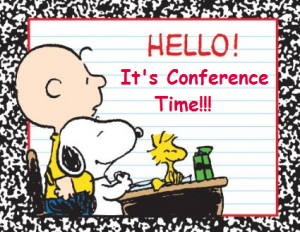
Questions to ask at parent conferences
Parent teacher conferences are a time to build a partnership with your child’s teacher. Many parents go into the conference ready to hear the teacher’s view of their child’s academics and behavior. As Derek Jeter once said, “When it was time for parent-teacher conferences, I remember that I was always embarrassed about what my parents would hear about me!” However, it can also be helpful if the parent attends the conference prepared with their own questions.
Just like parents, teachers can get anxious during conferences. They too do not always know what to expect and usually have a rote agenda they follow. I was never more nervous than when I had the superintendent’s child in my class. He came to the conference alone and sat with his arms folded across his chest while I stammered and flubbed around trying to sound intelligent and informative.

If a parent wants honesty, appearing open and calm is good way to ensure the teacher will be sincere and forthcoming. Let the teacher know you are the type of parent who wants to be informed, this is so the teacher feels comfortable telling you their thoughts and won’t feel the need to placate you with their message.
Bringing your own questions to parent teacher conferences ensures that the issues foremost on your mind are discussed. If you are not proactive about organizing your thoughts prior to the conference, your concerns may be neglected. Prepare ahead of time by discussing your child’s progress report with them. Ask your child about school in general, such as, how they think they are doing and what they like and dislike about their classes.
Because parent teacher conferences are so very short, it may be best to tell the teacher upfront your most important questions. Questions can be broken down into two categories– what you want to know about your child and what you want the teacher to know about your child.
What you may want to know about your child:
➤ What are my child’s strengths?
➤ What does my child struggle with?
➤ How is my child getting along with other students?
➤ How are my child’s social behaviors?
➤ What support services are available for my child at this school?
➤ How much homework should my child be doing every night?
➤ And, most importantly, how can I help my child at home?
What you may want the teacher to know about your child:
Let the teacher know about any situation at home that has the potential to affect your child’s school work.
➤ Home situations: conflict in the family, death, new baby, sick pet, moving, etc.
➤ Family/child medical issues
➤ Feelings of inferiority
➤ Exclusion or harassment from particular classmates
➤ Frustration tolerance/what works to defuse
➤ Behavioral strategies the parent finds successful
➤ Strategies that motivate the child
➤ Verbal or tangible rewards that motivate the child
Advance knowledge of your child will shorten the teacher’s learning curve. The more the teacher knows about your child the less likely they will hastily use a strategy or intervention that has little or no effect. Leave the conference with a plan and schedule follow-up communication. Education is a shared commitment, by working together your child can benefit from open dialogue between home and school.




[…] a parent, communicate with the teachers so you know their procedures for assignments. Suggest that when at school your child take pictures […]